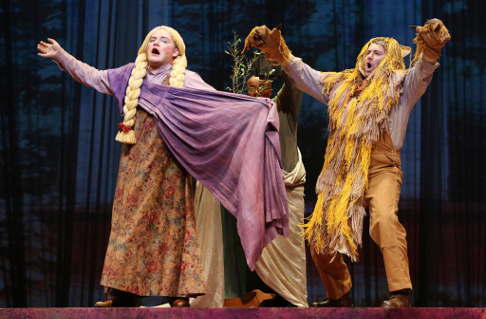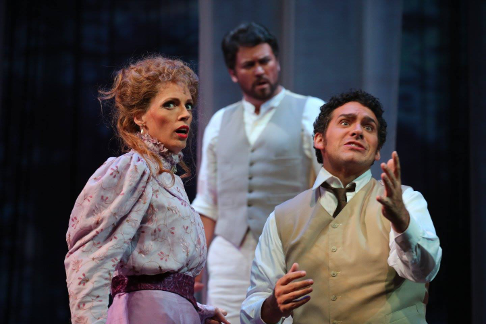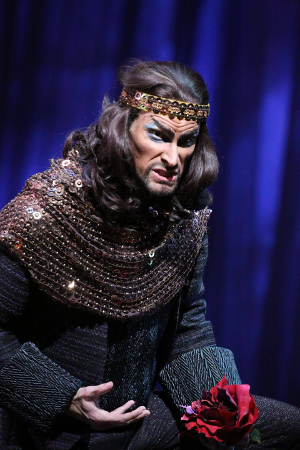![[Photo by David Takagi]](http://www.operatoday.com/12716350_10153473662502712_656306428577071032_o.png)
22 Feb 2016
HOT Dream in Honolulu
In a world opera schedule packed with safe bread-and-butter warhorses, Hawaii Opera Theatre gambled on a Britten rarity and came up smelling as sweet as a tuberose lei.
English Touring Opera are delighted to announce a season of lyric monodramas to tour nationally from October to December. The season features music for solo singer and piano by Argento, Britten, Tippett and Shostakovich with a bold and inventive approach to making opera during social distancing.
This tenth of ten Live from London concerts was in fact a recorded live performance from California. It was no less enjoyable for that, and it was also uplifting to learn that this wasn’t in fact the ‘last’ LfL event that we will be able to enjoy, courtesy of VOCES8 and their fellow vocal ensembles (more below …).
Ever since Wigmore Hall announced their superb series of autumn concerts, all streamed live and available free of charge, I’d been looking forward to this song recital by Ian Bostridge and Imogen Cooper.
Although Stile Antico’s programme article for their Live from London recital introduced their selection from the many treasures of the English Renaissance in the context of the theological debates and upheavals of the Tudor and Elizabethan years, their performance was more evocative of private chamber music than of public liturgy.
Evidently, face masks don’t stifle appreciative “Bravo!”s. And, reducing audience numbers doesn’t lower the volume of such acclamations. For, the audience at Wigmore Hall gave soprano Elizabeth Llewellyn and pianist Simon Lepper a greatly deserved warm reception and hearty response following this lunchtime recital of late-Romantic song.
For this week’s Live from London vocal recital we moved from the home of VOCES8, St Anne and St Agnes in the City of London, to Kings Place, where The Sixteen - who have been associate artists at the venue for some time - presented a programme of music and words bound together by the theme of ‘reflection’.
'Such is your divine Disposation that both you excellently understand, and royally entertaine the Exercise of Musicke.’
‘And there was war in heaven: Michael and his angels fought against the dragon; and the dragon fought and his angels, And prevailed not; neither was their place found any more in heaven … that old serpent … Satan, which deceiveth the whole world: he was cast out into the earth, and his angels were cast out with him.’
There was never any doubt that the fifth of the twelve Met Stars Live in Concert broadcasts was going to be a palpably intense and vivid event, as well as a musically stunning and theatrically enervating experience.
‘Love’ was the theme for this Live from London performance by Apollo5. Given the complexity and diversity of that human emotion, and Apollo5’s reputation for versatility and diverse repertoire, ranging from Renaissance choral music to jazz, from contemporary classical works to popular song, it was no surprise that their programme spanned 500 years and several musical styles.
The Academy of St Martin in the Fields have titled their autumn series of eight concerts - which are taking place at 5pm and 7.30pm on two Saturdays each month at their home venue in Trafalgar Square, and being filmed for streaming the following Thursday - ‘re:connect’.
The London Symphony Orchestra opened their Autumn 2020 season with a homage to Oliver Knussen, who died at the age of 66 in July 2018. The programme traced a national musical lineage through the twentieth century, from Britten to Knussen, on to Mark-Anthony Turnage, and entwining the LSO and Rattle too.
With the Live from London digital vocal festival entering the second half of the series, the festival’s host, VOCES8, returned to their home at St Annes and St Agnes in the City of London to present a sequence of ‘Choral Dances’ - vocal music inspired by dance, embracing diverse genres from the Renaissance madrigal to swing jazz.
Just a few unison string wriggles from the opening of Mozart’s overture to Le nozze di Figaro are enough to make any opera-lover perch on the edge of their seat, in excited anticipation of the drama in music to come, so there could be no other curtain-raiser for this Gala Concert at the Royal Opera House, the latest instalment from ‘their House’ to ‘our houses’.
"Before the ending of the day, creator of all things, we pray that, with your accustomed mercy, you may watch over us."
The doors at The Metropolitan Opera will not open to live audiences until 2021 at the earliest, and the likelihood of normal operatic life resuming in cities around the world looks but a distant dream at present. But, while we may not be invited from our homes into the opera house for some time yet, with its free daily screenings of past productions and its pay-per-view Met Stars Live in Concert series, the Met continues to bring opera into our homes.
Music-making at this year’s Grange Festival Opera may have fallen silent in June and July, but the country house and extensive grounds of The Grange provided an ideal setting for a weekend of twelve specially conceived ‘promenade’ performances encompassing music and dance.
There’s a “slide of harmony” and “all the bones leave your body at that moment and you collapse to the floor, it’s so extraordinary.”
“Music for a while, shall all your cares beguile.”
The hum of bees rising from myriad scented blooms; gentle strains of birdsong; the cheerful chatter of picnickers beside a still lake; decorous thwacks of leather on willow; song and music floating through the warm evening air.
![[Photo by David Takagi]](http://www.operatoday.com/12716350_10153473662502712_656306428577071032_o.png)
In a world opera schedule packed with safe bread-and-butter warhorses, Hawaii Opera Theatre gambled on a Britten rarity and came up smelling as sweet as a tuberose lei.
Director Henry G. Akina has skillfully crafted an unfussy, straight forward, tightly organized production of A Midsummer Night’s Dream, that offered few surprises but ample delights. Mr. Akina’s clarity of story-telling is a welcome asset, and he moves his performers around like the seasoned pro he is, with utmost clarity of purpose.
Mortals, gods, and rude mechanicals alike are well-characterized here, not only as definitive, identifiable groups, but also as highly individualized components in the story. Some whimsical touches drew audible audience appreciation, whether it was Tytania playfully wriggling her behind onto a hammock; Puck’s astonishing defiance of gravity with weightless leaps and jetées; or Lysander’s and Demetrius’ use of Helena as a human rope for an amorous tug-of-war.

Peter Dean Beck’s set design was highly efficient: a workable center stage unit set of platforms and stairs that provided an ideal environment for varied scenes and locales. This unit was beautifully framed by a diaphanous “forest” of legs and borders on which were projected a spectacular series of images, masterfully designed by Adam Larsen. The constantly modulating, universal woods changed seasons, changed climates, and conveyed a well-calibrated sense of the passing of seasons. The ‘autumn’ leaves falling as the lovers transitioned was a feat of potent and moving imagery.
Mr. Beck complemented Mr. Larsen’s projections with a carefully considered lighting design: atmospheric, moody, and always well-judged. The simple addition of a set of “tree trunks” (in the form of stylized drapes that flew in and out) was all that was needed to complete the magical playing space. That said, I do wish that actors hadn’t kept bumping into those fabric “trees” causing them to jiggle. There was a cleverly crafted hammock for the Fairy Queen, and a simple workbench on saw horses was smoothly schlepped in and out by the rude mechanicals. In total, Beck contributed a practical environment of scenery and lighting that was admirable for its visual economy.
Helen E. Rodgers has contributed a commendable cornucopia of fantastical costumes with her inspired design, aptly defining each divergent group, while simultaneously dressing each individual in apparel distinctive to their function in the story. Rick Jarvie’s and Sue Sittko Schaefer's imaginative, spot-on wig and make-up design was a critical component in the success of the production, enhancing the performers in making their full effect.
Best of all, singing was of a uniformly high standard throughout. As Lysander, John Bellemer displayed a compact, pliant, gleaming lyric tenor. He was well complemented by Joshua Jeremiah as Demtetrius, whose warmly appealing, burnished baritone was wedded to exceptional diction. Both cut strapping romantic figures.

Rachelle Durkin was a commanding presence as a delightfully daffy Helena. Her accurate, laser-focused coloratura was counter balanced by evenly produced melismas, vocally a cross between a tuneful yapping poodle and a mournful lovesick spaniel. All that was wanting tonally was perhaps a bit more womanly allure. Claire Shackleton’s smooth, ripe mezzo gifted the role of Hermia with a luxurious lower-middle and an effortlessly floated top. These four lovers triumphed in the great Act Three quartet, their fresh, youthful instruments soaring, aching, and tumbling over each other in heartfelt, overlapping phrases. It proved to be the heart of the show and the unequivocal triumph of the evening.
Anne-Carolyn Bird and Daniel Brubeck were flawlessly paired as Tytania and Oberon, regal, statuesque, and, oh yeah, sexy. Ms. Bird’s silvery, shimmering soprano shows off a solid technique, alluring tonal beauty, and supreme clarity. Her lovely appearance and regal carriage served the role well. Mr. Brubeck’s appealing, mellifluous countertenor was freely produced and it dripped with class, both in richness of sound and in delivery. There could have occasionally been a bit more point in the lower register, but his elegant singing, lanky demeanor and ethereal movement made for a fine Fairy King.
Paul T. Mitri was near perfection as Puck. While this spoken role is greatly truncated in the libretto adaptation, Mr. Mitri made every syllable count and he accurately spoke his lines in synch with the musical stings. Moreover, he was a wiry larger-than-life omnipresence owing to an energetic, super human physicalization that leapt and tumbled and bounced and vaulted and floated like an Energizer Bunny on Red Bull channeling Roger Rabbit. A star turn, indeed, Paul.
Nathan Stark made an auspicious role debut as an uncommonly fine Bottom. His stage demeanor was by turns pompous, genial, blustering, and endearing and he captured every bit of the part’s humor, especially when portraying the overwrought Pyramus. His well-schooled bass-baritone has a steely thrust, and its easy amplitude allowed it to ring out in the house. Mr. Stark’s authoritative impersonation made us love to be annoyed by this meddlesome tinker. His loose-limbed antics as the ass were the perfect partner to Tytania’s ‘gaga’ spooning, but did the director have to let the “soundly sleeping” couple visibly get up and casually exit the stage halfway through Act II?
Buzz Tennent’s stolid, resonant baritone showed great nuance and musicality as Quince/Prologue, missing only a bit of incisive bite when the orchestration thickened around him. Leon Williams (Starveling/Moonshine) is a local favorite and it is easy to see why since he is a natural stage creature and has a rich, rolling baritone, seamlessly deployed. Kyle Erdos-Knapp’s sweet, honeyed tenor was a perfect fit for the beardless, just-post-pubescent Flute/Thysbe. As the latter “damsel” Mr. Erdos-Knapp flounced and minced around the stage with great abandon, and his melodramatic stage movements nailed every laugh.
Tyler Simpson was a definite asset to the proceedings, his bass a pleasing addition as Snug/Lion. The dual roles of Snout/Wall were in the capable care of tenor Nathan Munson, whose steady and secure comprimario singing was infused with engaging personality. Mr. Akina was especially successful in bonding this diverse band of singing comics into a finely tuned ensemble with well-judged focus and unity of purpose. Great team players, all.

Even the very smallest roles were splendidly cast. As Theseus and Hippolyta, Jamie Offenbach and Katharine Goeldner come onstage very late in the evening, but when they did it was no holds barred. Mr. Offenbach has a height and noble bearing that warrant attention, and his penetrating, dark baritone scored with the riveting outpouring of every phrase. Ms. Goeldner’s imposing, evenly produced mezzo similarly weighted each pronouncement, making her every measure a joy to hear. It is not often two performers can come in at the 11th hour with such brief opportunity, and momentarily take over the show, but that’s just what they did, brilliantly. They left us wanting more. Much more.
Rounding out the cast was a simply stunning group of children as the fairy chorus, easily the equal of any youth group I have yet heard in any opera. Their accurate ensemble singing was surpassed only by the high quality of the four young soloists. They were consummate professionals throughout, executing their varied choral positions beautifully, always mindful of the dramatic pacing, and completely focused on the task at hand.
Benjamin Britten was a master of orchestration. He explored endless variety of effects, combined sounds in unique and challenging ways, and demanded virtuosic playing that stretches a band to its limit and provides no hiding place. Even a highly skilled orchestra that plays together almost daily is challenged by A Midsummer Night’s Dream. The ethereal banks of shimmering strings, the unsettling portamenti, the chattering and skittering winds, the relentless shifting percussive effects, and the angular (dare I say, ungrateful?) arpeggiated “fanfares” in the brass are just a few of the daunting requirements.
If the result in the pit was not always idiomatically seamless, this was nonetheless a very fine, accomplished effort thanks to the inspired conducting of William Lacey. Maestro Lacey is a real find, and I always had the secure feeling that he knew how to confidently draw the very best from his players and his cast. He found just the right arc for each Act (not to mention the entire evening), and while he could certainly whip up a wickedly frenzied mosaic of sound when required, his greatest achievement may have been in allowing just the right amount of serenity to inform the introspective stretches, allowing them to “breathe.” He partnered the singers expertly, wrung every bit of color out of the score, and summoned up the comedic elements with gusto. Mr. Lacey would seem to have a great future and boy, do we need him!
If there are easier ‘sells’ than this operatic rarity, the Tuesday night audience didn’t seem to know or care, responding with unbridled enthusiasm. The overall charm and accessibility of HOT’s winningly executed production wrapped the rapt crowd in a joyous artistic embrace. Dreamy, indeed.
James Sohre
Cast and production information:
Puck: Paul T. Mitri; Tytania: Anne-Carolyn Bird; Oberon: Daniel Brubeck; Lysander: John Bellemer; Hermia: Claire Shackleton; Demetrius: Joshua Jeremiah; Helena: Rachelle Durkin; Quince/Prologue: Buz Tennent; Snug/Lion: Tyler Simpson; Starveling/Moonshine: Leon Williams; Flute/Thisbe: Kyle Erdos-Knapp; Snout/Wall: Nathan Munson; Bottom/Pyramus: Nathan Stark; Theseus: Jamie Offenbach; Hippolyta: Katharine Goeldner; Conductor: William Lacey; Director: Henry G. Akina; Set and Lighting Design: Peter Dean Beck; Costume Design: Helen E. Rodgers; Wig and Make-up Design: Rick Jarvie and Sue Sittko Schaefer; Projections Design: Adam Larsen. Hawaii Opera Theatre, 16 February 2016.